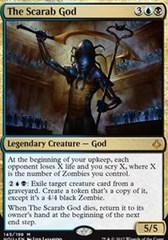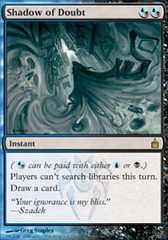Self-Confidence and Information in Magic

Since this is my first piece on this site I should do a little bit of an introduction. My name is Dave, some of you out there might know me as DaveSea from Twitch. I’m from Dublin and have been playing Magic roughly since Scourge. Over the past two years I’ve been trying my hand at full time content making and Magic playing. This dedication has led to a few decent Grand Prix finishes and my first Pro Tour appearance at Kyoto (however, the less said about the result there the better). I’ve always been bad at games, I know that may be not something you want to hear about the author of the article you’re about to read, but this means that I have to put a lot of work in to get good at any given game. What a lot of people who play Magic might pick up naturally because of high intelligence, I grind out and learn through a lot of trial and error, and questions. A lot of theory pieces I will be writing will reflect this, I’m going to try to explain faults I’ve found in my own game and how I plan to avoid these pitfalls again.
On that note I’ll dive straight in. I played an RPTQ in London recently, I didn’t fare too well, going 4-3 with a pretty bog-standard version of Mono-Black Zombies. The result didn’t irritate me as much as my deck choice did. Coming up to the event I was testing UB Scarab God Control. While the deck isn’t a complete world beater it did have very positive match ups against midrange decks like Temur Energy and BG Snakes, while also not being bad against the aggro decks in the format. This lined up with what I expected to be played at the RPTQ. While I wasn’t 100% sure because it’s hard to predict what people will play at RPTQS, I felt that Temur was what people will gravitate towards when trying to beat Zombies and GB Snake, both of which are pushing red out of the format. So why didn’t I go with my read? Simply because I didn’t have enough confidence in myself to follow through. Where did this lack of confidence come from? Well anyone who knows me would probably say I’m not a very self-confident guy in the real world but in Magic I usually don’t have the same issue and have on different occasions trusted my instincts, usually to my benefit. So, this got me thinking what else could have influenced me in the run up to this event and what I could do to make sure this didn’t happen again.

Magic is in a golden era of information. There are more articles, videos, YouTube channels, blogs and streams than ever before all with excellent players and content creators behind them. This in most senses is fantastic, it allows people like me to have their voice heard and give us a platform. It has also levelled the playing field in a very meaningful way, any player who wants to become better at Magic has all the information at their fingertips, all they need is time. There is a downside to this though and that’s how we digest this information and what parts of it to believe. I don’t think that a content creator is ever trying to deliberately misinform people but in the end sometimes they are just wrong or have a bias in their information. An example of this could be when a pro player says that they think a match up or deck is good simply because they keep winning with said deck. A lot of the time they are correct but other times they could be winning because they are a better player than most opponents, or a number of other variables. It’s hard for normal players to know when this is the case so that is where self-confidence can be affected. When you play a match up a lot and find you are favoured, only for a couple of pros to say otherwise in articles or interviews, it makes you doubt yourself, how could you be right if some of the best players in the world are telling you otherwise? This was one of the scenarios that directly effected my own self-confidence going into the RPTQ. Gabriel Nassif streams, his streams are very informative and he is easily one of the best players in the game. He was also testing the UB deck which was awesome for me as I could see how someone else developed the deck over time. On the last day I watched him play, Gabe was tilted, things weren’t going his way and he was at times getting unlucky. This lead to him play a bit worse and even he said multiple times he felt like he was tilting off. This should have been an indication for me to disregard his testing that day but I found myself asking if one of the best players of all time can’t buy wins with this deck how could I win. This question was pretty stupid because Gabe was tilting quite hard but also he was losing match ups that I didn’t care about. Mostly against a red deck that I didn’t think would show at the RPTQ , or losing to brews, bad luck and sometimes both. None of which should effect my testing. In the end it’s hard to combat this kind of thing influencing me, as a mid-level grinder I’m always going to look up to pros. Learning to take their content and opinions with context and not treat it as gospel seems like an important step forward for me in the future.

The golden era of information has led to the average Magic player being better informed and therefore on average a much better player. This means that there are a lot of high level grinders trying to do well at GPs and get onto the pro tour, in other words my peers. All of this means there are a lot of players whose opinions I respect and actively seek. A major problem with this is that Magic isn’t really black and white, so I often end up with conflicting information. Massively conflicting. The range of things said about the UB Control deck went from “unplayable garbage” to “best deck for the weekend” depending on who I was talking to. Now this doesn’t mean that any of them were wrong, they were just using their own perspective on things. But like the Pro Tour shows us on a regular basis, put two groups of excellent players in different rooms and they are going to come up with two different interpretations of cards and decks. The answer to this problem is a bit simpler and that’s to follow your instinct. It’s much harder to discount a pro’s opinion but when you’re asking a peer of a similar play level as you, the tie breaker in your decisions should be your own testing and instincts. This is not to say you should disregard other opinions, this information could still be invaluable, but when a decision is close you should, in the end, follow your own opinion.
Lastly, what influenced my choice for the RPTQ was experience. During testing for Pro Tour Kyoto pretty much everyone found mono red to be insane, this meant that I didn’t want to play it. My thought was that pro teams would be able to beat it even though I couldn’t find a way to, the deck was very linear and a known entity and historically unless an aggro deck is completely broken there are always tools to stop it. This lead me to play Eldrazi Red, it’s a version of mono red that goes much bigger and isn’t affected by the cards that hate on the small red deck. The major issue with that was everyone played mono red as no one had found a way to reliably beat it yet, meaning my meta call was pretty awful. That rocked my self-confidence in predicting the meta game successfully again in a similar situation, I knew for the RPTQ Zombies was the best deck going into the weekend and that people would be gunning for it. My hope was that others would beat it and like the mono red Eldrazi deck, UB would prey on the decks that beat Zombies. This set off major alarms bells because of the PT Kyoto incident and made very scared to pull the trigger and get punished again. The thing is, while these two situations were very similar, they weren’t the same. In the case of Kyoto I didn’t know what beat red and had hoped that players better than me would figure it out and I could exploit that. For the UB deck I knew exactly what people would play to beat Zombies, they would play Temur and other midrange decks. Exactly the style of decks that UB could prey on. I didn’t have to hope that people would be on the same page as me or if I was thinking too far ahead like I did in Kyoto, the information I had was way more simple and clean. I let emotion from my previous mistakes influence my decision instead of relying on the information I had learned. I remembered the feeling of getting my Pro Tour deck very wrong and I didn’t stand back and really examine the differences in the situations until recently. This is probably the simplest lesson from this experience: There is no place for emotion in decision making in Magic. Fear of failure got in my way at the RPTQ and while that emotion and mind frame can be hard to overcome, it’s essential to being a great Magic player.
One of the first things any good magic player will tell you when you ask them “How do I get better?” is to learn from people better than you, watch them, read articles, go over old coverage, but with the amount of information out there this can be daunting and difficult. It’s not only enough to absorb this information but you must learn how to digest it in the proper way, with context and perspective. The hit in my self-confidence came from my inability to do this, to be objective about a result instead of looking back at it with remorse. All we can hope from these mistakes are lessons. I think the RPTQ taught me a bit about how I handle information and how important confidence can be in the decision making process. Hopefully this insight helps others avoid making the same mistakes!
If anyone wants to chat to me about the article, make sure to come watch me on Twitch or follow me on twitter.





